Articles about reggae music, reviews, interviews, reports and more...
Rototom Sunsplash 2015

Rototom Sunsplash 2015
A win: win experience.
The Festival
The 22nd Rototom Sunsplash festival can be described as a win: win experience for all. A total of 32 top international acts graced the main stage over the 8 days, whilst numerous others took to the Showcase, Dancehall, Dub Academy, Ska Club and Roots Yard to make their music – and that’s after the revellers had passed a full afternoon at the reggae-infused sun beach!
From veteran Wailer Junior Marvin’s opening on the Main Stage on the first night to U.S. newcomers SOJA’s closing on the last night, this was a blessed festival. Around 250,000 visitors from 73 countries across 5 continents made it what Rototom President Filippo Giunta calls ‘the biggest reggae festival in Europe’. Alongside its multi-cultural character, the festival’s age span shows that the family guest is all-important – with 16,000 under 12s and 9,600 over 65s enjoying the sunny vibes. This year, a record single night attendance was set when 35,000 showed up for the Major Lazer visual and sound spectacle.
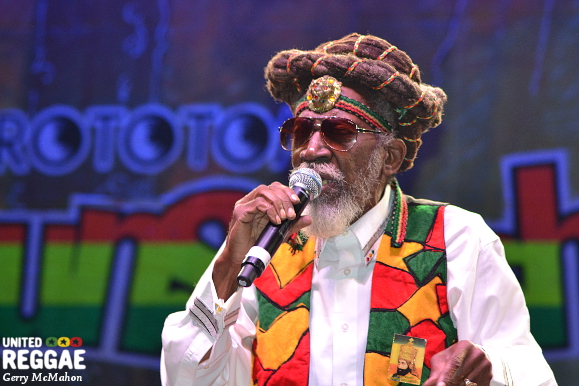
The Music
Since its relocation to Spain in 2010, a notable development has been the festival’s increased international dimension. For example, at Rototom 2015, across the 5 main performance areas, artists from Austria, Belgium, Brazil, Canada, the Canary Islands, Cameroon, Chile, France, Germany, Holland, Italy, Japan, Jamaica, Kenya, Macedonia, Mexico, New Zealand, Peru, Poland, Senegal, Sierra Leone, Spain, Sweden, the United Kingdom, the United States, Venezuela and the Western Sahara performed over the 8 days.
On the main stage festival goers were treated to an array of talent spanning the full A to Z of the reggae genre. With something for everyone, the roots revellers got Lee Perry, Bunny Wailer Katchafire, Macka B, Clinton Fearon, Junior Marvin, Uprising Roots, Africa Unite, Uwe Banton, Green Valley and Protoje, whilst the dancehall driven masses got Super Cat, Barrington Levy, Josey Wales, the colourful Capleton and Brigadier Jerry, leaving the lovers to leap for Jah Cure, Etana and Holly Cook, whilst the rock influenced SOJA and Chambao’s fusion of flamenco and electronic rhythms contrasted with the ‘Marley extravaganza’, as an array of Spanish singers left their indelible mark on the event.
Of course everyone had their own preferred style, show and artist preference - so one woman’s must see show was another man’s must miss. However, by common consensus there were some big hits at the festival. First amongst these was Major Lazer, who engineered a rave effect via a mix of techno, electronic and dancehall styles, played out amidst plumes of smoke, confetti, and an extravagant light show. This cutting edge spectacle contrasted with the delightful Pioneers (from 1962!), led by its duo of old timers - Jackie Robinson and George Dekker - who gave us a welcome blast from the past with ‘Long Shot Kick The Bucket’ and many more oldies but goldies. Later that same evening Bunny Wailer appeared with his crack Solomonic Orchestra, driven by the formidable axe men Dwight Pinkney and Keith Francis. Bunny’s turn was akin to that of a legend acknowledging his patrons, as he dipped into hit material spanning a 50 year period. This ‘Rootsman Skanking’ is unlikely to live forever, so availing of the opportunity to catch the original Wailer doing his high grade show had something of the feeling of ‘ye olde last-chance-saloon’ – not to be missed.
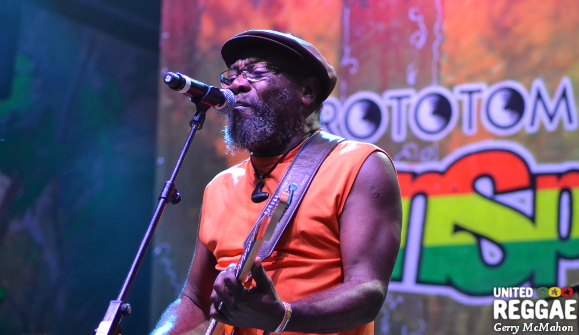
Another early festival feature that set the audience alight came from Jah Cure, who gave a sterling performance - culminating in the well-received Marley classic ‘Who The Cap Fit’. Cure’s show – which opened at a blistering pace – undoubtedly served to reinforce his growing reputation. Ex-Gladiator Clinton Fearon and his Boogie Brown Band also put on an absorbing show, befitting Fearon’s graceful demeanour and musical status. And Bad Manner’s lead singer Fatty left nothing behind at Rototom. Bringing bags of punky English aggression to the massive at the ‘Peace Revolution’ titled festival, all were happy to hear the band gallop through a heavily ska-influenced set, that provoked memories of skinheads, punks and teddy boys getting stuck in!
The U.K.’s (now mainly pop-oriented) Aswad show spanned generations and a range of reggae-style spin-offs in the process. Though missing their spiritual leader, Brinsley Forde – who has attracted some notoriety recently in his private life – the Aswad set served to remind the audience of the long road travelled by the group since they exploded onto the reggae scene in the mid-1970s. We were also reminded of their capacity to frame catchy tunes, as their 1988 No. 1 hit ‘Don’t Turn Around’ set the audience alight. At the other end of the time zone came Italy’s youthful and very popular Mellow Mood. No longer seen as some kind of novelty act, this 2 twin (L.O. and Jacob) outfit put on one hell of a show, forcing the audience to dance, sing and sway in tandem with their energetic music and mesmerising movements. Rototom regulars that have had the pleasure of seeing Mellow Mood in the past noted that this duo are progressing into a formidable musical force.
It was also a pleasure to see another Italian group on show, as Africa Unite’s Bunna bounced in delight through his set, clearly enjoying the reunion with his long time friends, the festival’s Italian founders. Alongside Madaski – who shared some of the singing load – Bunna and his band put on a rip roaring performance. And of course he provoked a loud response to his inquiry as to whether there were any Italians in the massive! Africa Unite’s status at Rototom was further solidified by this showing.
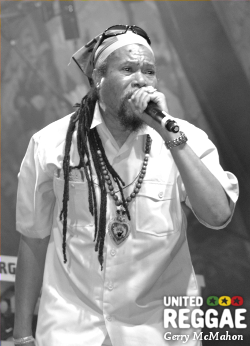 The legendary bassist Lloyd Parks also did his bit at the festival, leading the ‘We The People’ band as they warmed up the audience for the arrival of Josey Wales and Brigadier Jerry - who gave us generous samples from the repertoires that enabled them to rule the dancehall circuit in the 1980s. In fact, so successful were they in delivering the goods that many forgot that (the advertised) Charlie Chaplin had failed to show up!
The legendary bassist Lloyd Parks also did his bit at the festival, leading the ‘We The People’ band as they warmed up the audience for the arrival of Josey Wales and Brigadier Jerry - who gave us generous samples from the repertoires that enabled them to rule the dancehall circuit in the 1980s. In fact, so successful were they in delivering the goods that many forgot that (the advertised) Charlie Chaplin had failed to show up!
The festival’s extensive musical span was also evident from the generous servings of reggae that were delivered in a hip-hop infused style by a host of artists. These included the energetic and well received Spanish artist Morodo, Cham (who gave full vent to his Dancehall-driven ‘Whine Up Me Body’) and Matisyahu (who gave us a rigorous rendition of his moving ‘Jerusalem’ hit). These sets and styles fitted well alongside Popcaan and his Dub Akom Band (playing their popular ‘Love Yuh Bad’ song) and contrasted starkly with the wonderful African rhythms brought to the festival by the refugees that are the sensational Sierra Leone All Stars.
On the festival’s closing night, Etana warmed up the crowd with a lively lash at cover versions of ‘Simmer Down’, ‘Monkey Man’ and ‘You Don’t Love Me’ amongst others, followed by a bloc of her own material that served to bolster her burgeoning reputation with the Rototom massive. And to the delight of the ladies in the audience – who took over when ‘Jah Blessings’ kicked in - she’s no slouch on the love themes either! Though missing her supporting female vocalists this time round, Etana is clearly a musical force to be reckoned with.
The mighty Macka B. with his conscious lyrics also put in a characteristically barn-storming performance, before the genius that is Lee Scratch Perry worked through a set packed full of good music, quirkiness, scatological references and much of Perry at his best. Though sometimes feigning insanity and innocence, Perry knows exactly what’s going on around him. In the understated style to be expected of a near 80 year old, he drives much of it. So comfortable is the artist in his skin, that though performing before one of the (reggae) festival’s biggest turn outs, he turned to his lead guitarist and instructed him to: ‘Give me some blues’. The lead guitarist duly obliged. And so Rototom 2015 was brought to its peak. This was enabled as (both Macka B. and) Perry were backed by the wonderful Upsetters – in the current format of Jah Poleon (bass), Sinclair Seales (drums), Ryan Sutherland (synth) and Michael Fellowes (lead). Long live Mr. Perry and his Upsetters!
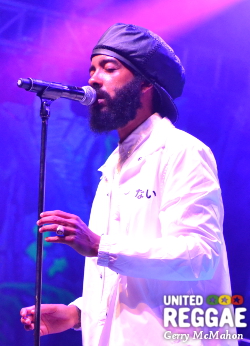 The eagerly anticipated Protoje show on the festival’s closing night did not disappoint either. His third album Ancient Future was recently released to much acclaim - and rightly so. Chances are it will sit snugly in the genre’s Top 10 for 2015. It will also provide the artist with a large legacy, via some strong tracks for his live performances – many of which featured in his Rototom 2015 set. Indeed, so popular was his presence that show time could have been doubled to popular acclaim. An abiding memory for many will be his rendition of the hit ‘Who Knows’ (without Chronixx!), whilst ‘Stylin’, ‘Hail Rastafari’ and ‘Criminal’ were also well received, before the audience exploded to his exhilarating ‘Kingston Be Wise’ rendition.
The eagerly anticipated Protoje show on the festival’s closing night did not disappoint either. His third album Ancient Future was recently released to much acclaim - and rightly so. Chances are it will sit snugly in the genre’s Top 10 for 2015. It will also provide the artist with a large legacy, via some strong tracks for his live performances – many of which featured in his Rototom 2015 set. Indeed, so popular was his presence that show time could have been doubled to popular acclaim. An abiding memory for many will be his rendition of the hit ‘Who Knows’ (without Chronixx!), whilst ‘Stylin’, ‘Hail Rastafari’ and ‘Criminal’ were also well received, before the audience exploded to his exhilarating ‘Kingston Be Wise’ rendition.
The Activities
Though it’s the line-up of artists that initially attracts an audience, the full fantastic festival experience that is Rototom is often what is remembered long after the event. Thankfully, Benicasim – an accessible and well-resourced town - was not too hot this year. So with the festival site located a short distance from the town centre and its long beach, the extensive range of activities – on the beach and at the festival site - proved popular. The Rototom information sheet listed almost 80 separate daily activities, spanning African dance classes on the beach at midday, to the dancehall at midnight, right through to Resident DJs on the Showcase Stage, starting at 07h20 for the early morning revellers!
From midday to early evening the local beach was commandeered by the DJ.s, dance classes and sun worshippers. On site, the Social Forum convened about 20 presentations cum debates, with features on Islamophobia, the environment\eco-system, conflict in the Ukraine, Guantanamo Bay, freedom of expression and cannabis laws. In tandem with this, the Reggae University and the Asociacion Cultural Reggae (ACR) convened around 25 separate events (i.e. films, presentations, seminars) over the 8 days. A big attraction was the well-received premiere of Lee Scratch Perry’s ‘Vision Of Paradise’ movie. University guests included Josey Wales, Brigadier Jerry, the Pioneers and Paolo Baldini of Mellow Mood.
Characteristically, Bunny Wailer’s appearance at the Rototom Reggae University was preceded by thunder and lightning! However, in line with his stature, it gave way to some Spanish sun and the moderate temperatures and humidity that made this one of the best Sunsplash festivals of all. At the Reggae University, Bunny was helped through his history by the multi-talented David Katz in a ‘tell us about that track’ format. Bunny – or Jah B. as he is known betimes – is a good clear speaker, who gainfully used his performance skills to engage the large gathering. Though the session didn’t spark any of the firecrackers on show when Bunny last graced the University in Italy in 2009 (in the company of one of his nemeses - Island Record’s Chris Blackwell), it was good to see such an important reggae root and living link declare: ‘I’m here to keep singing ‘Simmer Down’ ’. Interestingly, his aide, Maxine Stowe availed of the opportunity to advise listeners that they should exercise caution when engaging with the Marley Natural or Marley DNA, for – in the context of the Marley\Wailers franchise and legacy conflict – to great applause, Bunny reminded all that he had: ‘never left the Wailers’. However, with the Marley name now synonymous with so much that is ‘reggae’, her exhortations may well prove futile.
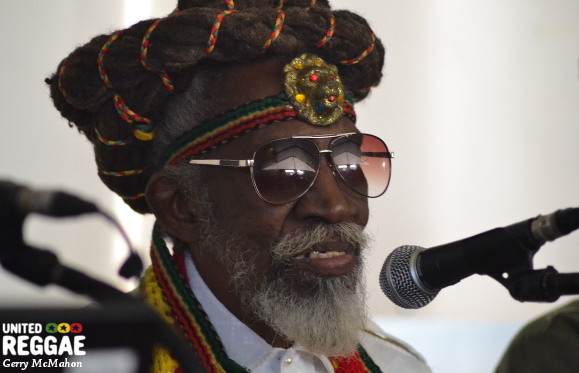
On the other activities front, the MAGICMUNDO Festival area drew on experienced entertainers to offer creative, fun-filled ecological experiences via a host of creative initiatives - including hand-held puppet shows, acrobatic jugglers, games, workshops and fashion shows. The well attended Rototom Circus also introduced festival goers to the art of classy street circus performances. These Circus and the Magic features proved popular with the family audiences and confirm the importance thereof to Rototom.
The ‘African Village’ was also a ‘must see’ festival feature, as the very best of African percussion, cuisine, music and dance went on display. The Village also ran an agenda based upon burning issues central to African history, culture and development. This wasn’t too far from the ‘Non-Profit’ area, where a range of progressive groups and campaigners made their case, including the Trenchtown Reading Centre, which is devoted to boosting the youth’s literacy levels in one of Kingston, Jamaica’s poorest ghettoes. The Living Energy – Vivir La Energía - area remained this year on a large spread located at the heart of the Festival site. It is often referred to as the festival’s ‘soul’, as (via a range yoga-type experiences) it’s a zone dedicated to the unification and love of all peoples – regardless of colour and creed.
The festival’s character is also very much reflected in its colourful mix of markets, restaurants, bars and cafes. The 20,000 campers on the site had immediate access to coffee, cocktails, crepes, cakes, kebabs, natural fruits, frites, pizza, fish, lasagne, tacos, burgers, ices and sweet spreads. Alongside these stalls, festival-goers were able shop for buttons, beads, bracelets, bangles, bags, belts or even sandals, shoes, skirts and scarves. Failing that, some stalls offered lampshades, lighters, hats, glasses, perfumes, earrings and even outdoor ornaments! In fact, there is more on offer at this Sunsplash than a large tribe could get through in a lifetime!
The Politics
It has long been the case that one of Rototom’s strongest suits is its attempt to display and encourage a political awareness. This is a tremendous but a tricky thing. Mixing politics with anything requires considerable craft. This year Rototom decided to dedicate the festival to: ‘help us to understand that we can and must act differently’ when ‘dealing with conflicts’. This is a laudable aspiration and Rototom can take some pride in the fact that it most definitely brought controversial issues to the fore this year. However, the manner of doing so confirms that – even when Rototom is involved - politics can be a divisive force.
The main talking point at Rototom 2015 was the decision to revoke an invitation to the artist Matisyahu. Otherwise known as Matthew Miller, Matisyahu is a Jewish-American reggae style rapper cum hip-hop artist. Having extended an invitation to perform, Rototom subsequently asked him to sign a statement or make a video clarifying his position on Palestine. This was in response to pressure from a Valencian-based group that opposes Israel's presence in Palestine. The group called for the artist’s boycott, pointing to his questioning of the existence of a country called Palestine.
Understandably, Matisyahu condemned the attempt to: ‘coerce (him) into political statements’. He added that politics played no part in his music. This provoked pressure (on Rototom) from a range of sources – most notably the Spanish government, who criticised their attempt to impose ‘a public declaration’ (from Matisyahu endorsing a Palestinian state) that ‘puts into question the principles of non-discrimination on which all plural and diverse societies are based’. Arising therefrom, Rototom apologised and re-invited Matisyahu, who gracefully accepted the re-invitation.
Win: Win
A cynic or hard-nosed observer would say that all sides have won in this Matisyahu-Rototom-Spanish Government-Israeli\Palestine conflict.
For Rototom, the festival’s extensive exposure in the international media could not have been bought. It is also true that we all make mistakes. In Rototom’s case the organisers were big enough to admit this and reinstate the invitation to Matisyahu, without unduly compromising their integrity or consciousness. As ever, there was no violence at the festival and Rototom can also take some pride in the fact that (yet again) it enabled freedom of expression and the right to peacefully display different points of view – which is exactly what happened throughout the festival and on its closing night, when both Matisyahu and the pro-Palestinian massive had their say in their own way.
For Matisyahu, it is also true that the exposure he has had in the international media could not have been bought. However, in the circumstances some will remain sceptical about his assertion that politics plays no part in his music. For example, (to his credit) 3 days after Rototom, Matisyahu brought his music to a synagogue near the gates of Auschwitz concentration camp. One might recall that in his day original Wailer Peter Tosh was vocal on the Israel-Palestine issue, whilst frequently raising the relationship between equal rights, justice and peace. In Tosh’s case, there was no denial that there was politics in his music and it is likely he would have applauded the Spanish rock\punk\reggae group La Gossa Sorda who stepped down from the Showcase Stage in protest at Matisyahu’s re-appearance on the Rototom bill.
For the Israeli-Palestine conflict, the exposure of this disgraceful and damaging war to an international audience is important and to be welcomed. In the opinion of the 250,000 or so who visited Rototom, reconciliation between the various interest groups would be even more welcome. Hopefully, some will play a role in enabling this peace in their own homelands and abroad.
Epilogue
Rototom’s ‘Matisyahu collision’ with the Spanish government will not have gone down well with the festival’s organisers. As guests of the nation, Rototom would prefer (and deserves) to be as well received as its progressive motives merit. This is (at least) the second time that the Rototom Sunsplash festival has provoked the ire of officialdom. In 2010 the festival migrated to Spain (from its home in Italy) in what might be described as ‘a cloud of ganja smoke’. That is, it found itself in a difficult position with some less than hospitable politicians in Udine who tried (unsuccessfully) to prosecute the festival for facilitating the use of illicit drugs. In response, Rototom claimed that it was leaving Italy due to Silvio Berlusconi’s racist Government’s immigration policy.
Notably, this is also (at least) the second time that reggae music has found itself on the political front line. It is only just recovering from the damage done by some of its (mainly dancehall) homophobic artists. The ‘change of tune’ by many of these artists in recent times (in response to negative feedback and venues cancelling their concerts) is welcome. However, it’s a far cry from the formidable role played by Bob Marley and his contemporaries in their progressive and successful fight against racism.
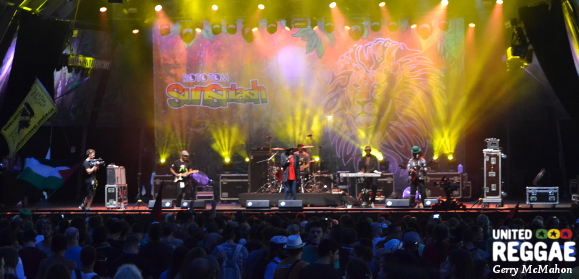
Going forward, Rototom will continue to learn and grow. It may even meet the request from many punters that it place large screens on site, to enable all in attendance to get a better view of the antics on stage. In the spirit of openness, many Rototom supporters would also like to know more about the financial fortunes of the festival. This might be a wise move – even if only to dispel fanciful notions that there is a flock of multi-millionaires in existence on the back of the festival’s success.
Rototom is probably not only the biggest, but the best festival catering for reggae enthusiasts on the planet. Long after its first patrons from 22 years ago have passed on, it will continue to roll. And so shall it be - rejoice.
Read more about this topic
Comments actually desactivated due to too much spams
Browse by categories
Recommended Articles
Latest articles
Recently addedView all
© 2007-2025 United Reggae. All Rights Reserved. Reproduction in whole or in part is prohibited. Read about copyright
Terms of use | About us | Contact us | Authors | Newsletter | A-Z














